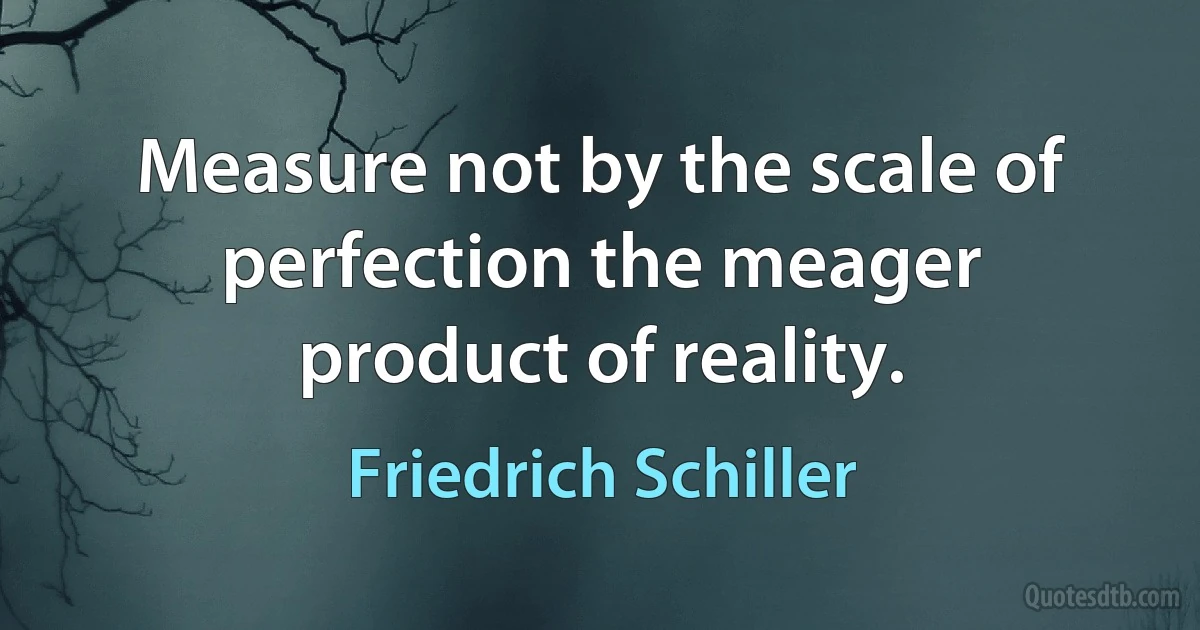Scale Quotes - page 28
In this play a reference is made by a Chief of Police to the political necessity for killing people: a necessity so distressing to the statesmen and so terrifying to the common citizen that nobody except myself (as far as I know) has ventured to examine it directly on its own merits, although every Government is obliged to practise it on a scale varying from the execution of a single murderer to the slaughter of millions of quite innocent persons.

George Bernard Shaw
People whose history and future were threatened each day by extinction considered that it was only by divine intervention that they were able to live at all. I find it interesting that the meanest life, the poorest existence, is attributed to God's will, but as human beings become more affluent, as their living standard and style begin to ascend the material scale, God descends the scale of responsibility at a commensurate speed.

Maya Angelou
To meet these challenges requires cooperation on a scale not seen before. A realistic reading of the world today demands reinvigorated international and regional institutions. It demands that we confront threats before they spiral out of the control. And it requires American leadership - to protect our interests and uphold our values.

Al Gore
The achievement of such a change of register through a sequential progression is a familiar procedure in the music of the "common practice." The significant distinction is that where Berg subdivides the registral span into equal, i. e., cyclic, intervals, his tonal predecessors subdivide it, in changing register through sequential transference, into the unequal intervals of the diatonic scale. As I pointed out in my last lecture, however, the qualitative transformation in the language of music which we have experienced in our century has a long prehistory. Beginning with Schubert, we occasionally find normal diatonic functions questioned in changes of key that progress along the intervals of the whole-tone scale, or the diminished-7th chord, or the augmented triad. An even more radical example of a cyclic progression in a tonal composition is...from Wagner.

George Perle
After 'Kong,' my knuckles have never recovered because I had to wear very heavy weights on my forearms and around my hips and ankles to get the sense of size and scale of the movement of the character You are telling your body that you are these things and that you're feeling these thoughts and that you're experiencing these experiences.

Andy Serkis
Evolution endowed us with intuition only for those aspects of physics that had survival value for our distant ancestors, such as the parabolic orbits of flying rocks (explaining our penchant for baseball). A cavewoman thinking too hard about what matter is ultimately made of might fail to notice the tiger sneaking up behind and get cleaned right out of the gene pool. Darwin's theory thus makes the testable prediction that whenever we use technology to glimpse reality beyond the human scale, our evolved intuition should break down.

Max Tegmark
Rabbi Elazar, son of Rabbi Shimon, says, ‘Since the world is judged by its majority, and the individual is judged by the majority, if he performs one Mitzva, happy is he, for he has sentenced himself and the whole world to a scale of merit. If he commits one sin, woe unto him, for he has sentenced himself and the whole world to a scale of sin.' (...) Moreover, it is written, "one sinner destroyeth much good.”.

Yehuda Ashlag
There is, in fact, neither red, green nor yellow magic. There is "doing." Only "doing" is magic." Properly to realise the scale of what Gurdjieff meant by magic, one has to remember his continually repeated aphorism, "Only he who can be can do," and its corollary that, lacking this fundamental verb, nothing is "done," things simply "happen."

P. L. Travers
Leaks have happened before. They are not new. But the industrial scale of leaking made possible through the digitisation of information and the ability to communicate instantly across the globe - that is new. If it is to be revolutionary, however, we need a model for a new type of politics.

Heather Brooke



